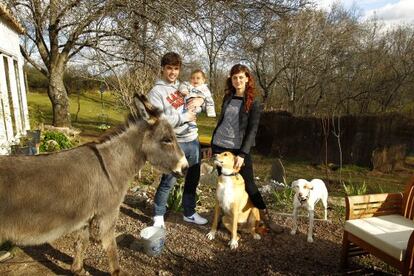Finding work out in the wilds
The Rural Entrepreneur Fair shows there are business opportunities out in the country for those keen to escape crisis-plagued big city life

A job at a multinational, an apartment in downtown Madrid, and a growing sense of discontent. Such is the daily routine for many people who are subjected to the stress of life and work in the big city and the never-ending cycle of consumerism. This was Lucía Molet's life until five years ago, when she decided to make a clean break. Instead of working for a large corporation in the heart of the capital, she now runs her own business in the wooded area of La Herrería, in El Escorial.
"I practically lived at the office," she recalls. "I spent hours stuck in traffic on my way to work. I was not happy. There was something missing."
Now 30, Lucía walks down the streets of El Escorial, looking back on the last five years and all the things that have changed since then: she traveled to South America, worked to save money to start her business, moved to the countryside, and had a child. Besides that, she set up the Rural Entrepreneur Fair, which held its second edition last weekend. She also recently launched a project called Emprende Natura, a training center for entrepreneurs seeking a more sustainable lifestyle.
"With a 25 percent unemployment rate, which is 50 percent for young people, the VAT hike, the cuts to health and education, and the lack of subsidies and financing options, life in the city has become impossible for many people," she says.
The average visitors to her fair are discontent city dwellers, unemployed youngsters, nature lovers with a university degree, and in general anyone who is unhappy with modern lifestyles and desirous of finding a more harmonious relationship with nature.
The opportunities for an entrepreneur in the countryside are plentiful¨
At the first edition of the Rural Entrepreneur Fair, for instance, Lucía met Fran Winberg, 42, and Vanessa Losada, 34, a couple who walked away from their successful lives in the advertising and art worlds to start a project called Menuda Vida, which specializes in organic, gastrovegan and gourmet food. "The business provides consulting, food products and training, with the goal of experimenting and researching the world of organic cuisine," explains Vanessa.
This couple's lives changed so much that they left Madrid to go live in the "eco-village" of Valdepiélagos, near Alcobendas, where they use solar energy, grow their own vegetables and use organic detergent to wash their clothes. They personally restored the space where they teach "vegan biocuisine."
"We were tired of the pace and the demands of our jobs, and a time came when our principles and our conscience weighed more heavily than success or money," says Fran, who admits that he used to earn more money at his old job. "Yet I am happier now," he says convincingly, adding that one needs to take risks in order to change reality.
Lucía goes even further and states that the universe always ends up rewarding the brave. "The business opportunities for an entrepreneur in the countryside are plentiful," says this expert in rural coaching. "Besides, Spain is clearly a rural country. And these villages are demanding the type of service that only exists in the city."
Carlos Bauren, 28, found one such opportunity in the field of animal training. "Before starting my business in 2009, I was already interested in dog-assisted therapy. They are useful in treating victims of domestic violence or children with disabilities like autism," he explains at his dog training school near El Escorial. Bauren notes that training wild animals allows you to care for them more humanely. "If you have to check a lion's mouth, I can show you how to do it without anesthetics. It's a great shock for the animal."
The Félix Rodríguez de la Fuente Foundation says that 84.5 percent of Spain's surface area is considered rural, but less than 15 percent of the country's total population lives within its bounds. This means that Spain's countryside is almost depopulated, which in turn means the land goes unprotected and that traditions get lost.
Julia Ramos, another participant at the fair, runs a business called La Agroteca, a space that brings together craftspeople, quality organic produce, and a deli serving dishes made from seasonal food products. Julia explains that her project seeks to strike a balance between social, environmental, cultural and economic issues. "I left my job as director of a well-known bar, Tula, and embarked on a journey that has led to this idea. I want to create a link between the countryside and the city through the theory of the common good; that is, without thinking exclusively about profits."
Fran, of Menuda Vida, agrees that corporations only care about the bottom line. "It's money above everything else. They feel no responsibility towards society or the environment."
Tu suscripción se está usando en otro dispositivo
¿Quieres añadir otro usuario a tu suscripción?
Si continúas leyendo en este dispositivo, no se podrá leer en el otro.
FlechaTu suscripción se está usando en otro dispositivo y solo puedes acceder a EL PAÍS desde un dispositivo a la vez.
Si quieres compartir tu cuenta, cambia tu suscripción a la modalidad Premium, así podrás añadir otro usuario. Cada uno accederá con su propia cuenta de email, lo que os permitirá personalizar vuestra experiencia en EL PAÍS.
¿Tienes una suscripción de empresa? Accede aquí para contratar más cuentas.
En el caso de no saber quién está usando tu cuenta, te recomendamos cambiar tu contraseña aquí.
Si decides continuar compartiendo tu cuenta, este mensaje se mostrará en tu dispositivo y en el de la otra persona que está usando tu cuenta de forma indefinida, afectando a tu experiencia de lectura. Puedes consultar aquí los términos y condiciones de la suscripción digital.








































